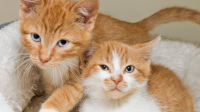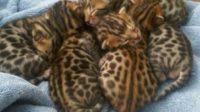
A Comprehensive Guide to the Diverse World of Cats for Adoption
Bringing a feline companion into your life is a rewarding experience that can fill your home with love, laughter, and endless entertainment. However, with the wide variety of cats available for adoption, it’s essential to do your research and find a breed that will suit your lifestyle and personality. This comprehensive guide will introduce you to the captivating world of cats, empowering you with the knowledge to make an informed decision that will lead to a harmonious and fulfilling human-feline bond.
Understanding the Basics of Cat Breeds
Cats are classified into various breeds based on their physical characteristics, temperament, and genetic heritage. While there are over 70 recognized cat breeds worldwide, each with its unique charm, we will explore some of the most popular and widely available options for adoption.
Short-haired Breeds
Short-haired cats are known for their low-maintenance grooming needs, making them ideal for busy individuals or those who prefer asleek and polished look. Some popular short-haired breeds include:
- American Shorthair: A friendly and easygoing breed with a sturdy build and a short, dense coat.
- Russian Blue: An elegant and affectionate cat with a soft, blue-gray double coat.
- Abyssinian: A slender and agile breed with a distinctive ticked coat that resembles that of a wild rabbit.
- Siamese: A vocal and outgoing breed known for its distinctive blue eyes and color-pointed coat.
- Sphynx: A hairless breed with wrinkled skin and a playful personality.
Long-haired Breeds
Long-haired cats are adored for their luxurious and often hypoallergenic coats, which require regular grooming. If you’re prepared for the additional upkeep, these breeds offer endless cuddles and a mesmerizing appearance:
- Maine Coon: A gentle giant with a long, thick coat that comes in a variety of colors and patterns.
- Ragdoll: A docile and affectionate breed with a silky, semi-longhair coat that feels like a doll’s plush fur.
- Persian: A graceful and regal breed with a long, flowing coat that requires daily brushing.
- Siberian: A sturdy and intelligent breed with a triple-layered coat that helps it withstand cold climates.
- Himalayan: A charming breed that combines the longhaired features of a Persian with the color-pointed coat of a Siamese.
Hypoallergenic Breeds
For those with allergies, hypoallergenic cat breeds offer a potential solution. While no cat is truly hypoallergenic, these breeds produce lower levels of the allergens found in cat saliva and dander:
- Siberian: As mentioned earlier, this breed’s triple-layered coat helps reduce allergen exposure.
- Devon Rex: A small and mischievous breed with a short, curly coat that sheds very little.
- Sphynx: Despite being hairless, the Sphynx produces less dander than other breeds, making it a suitable choice for allergy sufferers.
- Balinese: A long-haired breed that is known for its hypoallergenic qualities, thanks to its lack of an undercoat.
- Javanese: A silky-haired breed that inherits the hypoallergenic traits of its Balinese and Colorpoint Shorthair parents.
Senior Cats
Senior cats, typically aged 7 years or older, offer a wealth of love and companionship. They have often settled into a calmer and more relaxed lifestyle, making them suitable for those seeking a low-maintenance pet:
- Benefits of Adopting Senior Cats: They have a proven track record of personality, are less likely to be destructive, and may have lower adoption fees.
- Considerations: They may have age-related health conditions, require more frequent vet visits, and have a shorter life expectancy.
Mixed-breed Cats
Mixed-breed cats, also known as "domestic shorthairs" or "domestic longhairs," come from a diverse genetic background that often results in unique and affectionate personalities. They offer the best of both worlds, combining traits from various breeds:
- Advantages: They are generally healthier and more adaptable than purebred cats, have lower adoption fees, and provide a sense of individuality.
- Considerations: Their appearance and temperament can vary, and they may not meet specific breed standards.
Personality Traits to Consider
Beyond physical characteristics, it’s crucial to understand the personality traits of different cat breeds. Here are some key factors to keep in mind:
- Activity Level: Some breeds, like the Abyssinian and Siamese, are known for their high energy and love of play, while others, like the Ragdoll and Persian, prefer a more relaxed lifestyle.
- Affection: All cats exhibit affection in their own way, but breeds like the Sphynx and Ragdoll are renowned for their cuddle-bug nature.
- Intelligence: Several breeds, such as the Siamese and Siberian, are known for their intelligence and trainability, making them suitable for interactive games and activities.
- Vocalization: Some breeds, like the Siamese and Abyssinian, are more vocal than others. Consider your tolerance for feline chatter before adopting a "talkative" breed.
- Independence: Certain breeds, like the Russian Blue and Maine Coon, are more independent and may not require constant attention, while others, like the Sphynx and Ragdoll, thrive on human companionship.
Finding the Perfect Cat for You
To find the ideal cat for your lifestyle and personality, consider the following steps:
- Visit Local Shelters and Rescues: Explore local animal shelters and rescue organizations to meet a variety of cats in person. Observe their behavior and interact with them to gain insights into their personalities.
- Research Specific Breeds: Gather information about different breeds, their traits, and care requirements. Attend cat shows or consult with breeders to learn more about specific breeds that interest you.
- Consider Your Lifestyle: Evaluate your living situation, activity level, and preferences to determine the type of cat that would best complement your lifestyle.
- Meet Potential Cats: Once you have identified some potential cats, schedule meet-and-greets to get to know them better. Pay attention to their interactions with you, other animals, and children if applicable.
- Trust Your Intuition: Ultimately, the best cat for you is the one that feels right. Trust your instincts and choose a feline companion that brings joy and fulfillment to your life.
Frequently Asked Questions (FAQs)
Q: How can I prepare my home for a new cat?
A: Provide a cozy bed, scratching posts, litter box, food and water bowls, and an interactive toy or two. Create a safe and enriching environment where your cat can feel comfortable and entertained.
Q: What is the average lifespan of a cat?
A: The average lifespan of a domestic cat is between 12 and 18 years, although some breeds may have longer or shorter lifespans.
Q: How often should I take my cat to the vet?
A: It’s recommended to take your cat to the vet for annual checkups and vaccinations. Your veterinarian will advise you on the frequency of visits based on your cat’s age and overall health.
Q: How much does it cost to adopt a cat?
A: Adoption fees vary depending on the shelter or rescue organization. The fees typically cover spaying or neutering, vaccinations, and a microchip.
Q: Can I adopt a cat if I have other pets?
A: Yes, it’s possible to adopt a cat if you have other pets. Introduce the animals gradually and provide separate spaces for them to adjust to each other’s presence.
Q: What are the benefits of adopting an adult cat?
A: Adult cats have often settled into their personalities, are less likely to be destructive, and may have lower adoption fees. They can provide companionship and love without the high energy levels of a kitten.
Q: What are the challenges of adopting a senior cat?
A: Senior cats may have age-related health conditions that require additional care and financial commitment. They may also have a shorter life expectancy.
Q: How do I know if my cat is happy?
A: Signs of a happy cat include purring, kneading, relaxed body language, playful behavior, and a healthy appetite.






